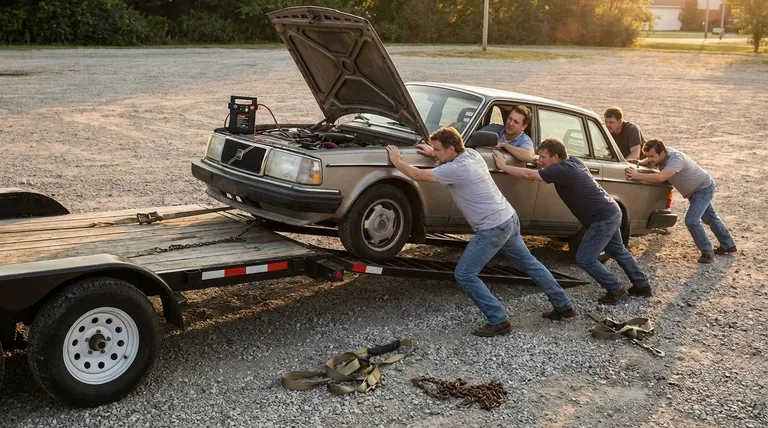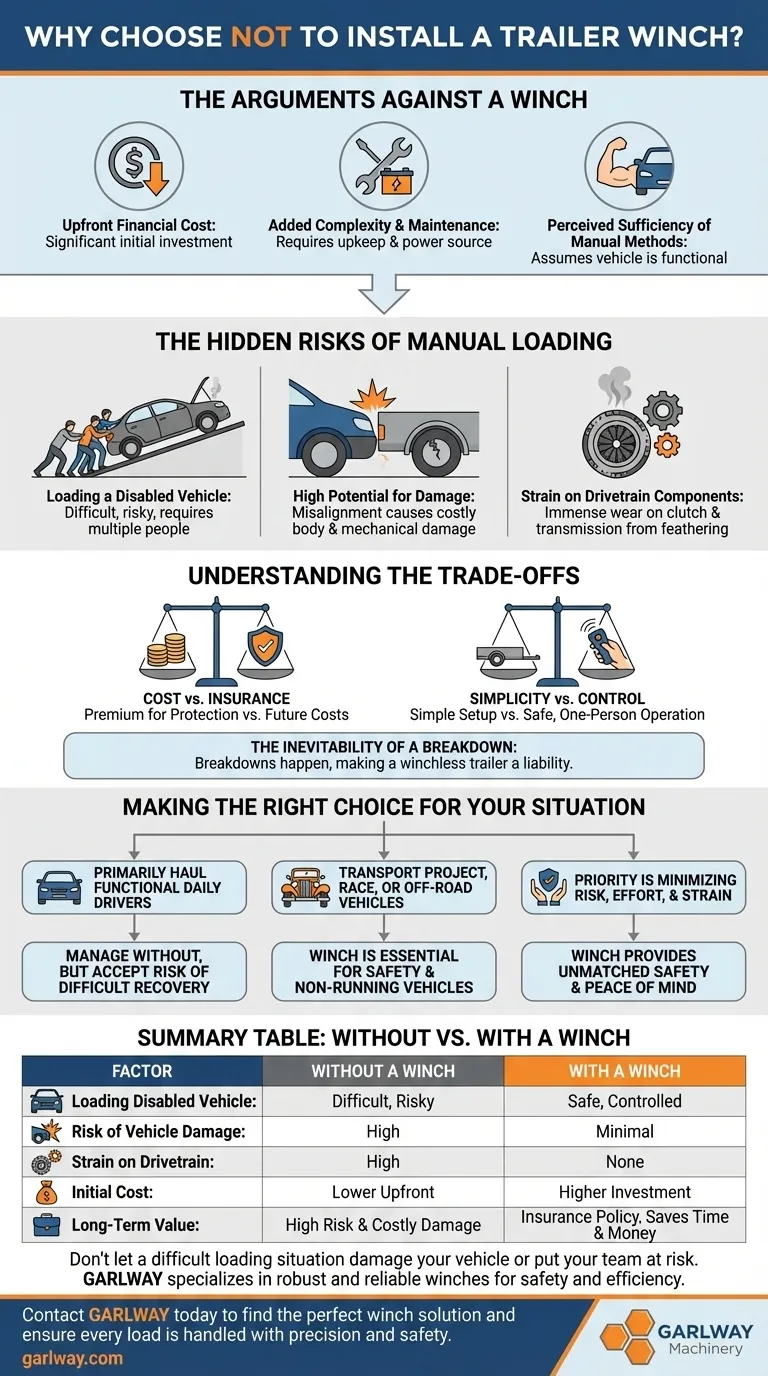Choosing not to install a trailer winch is typically a decision driven by three main factors: the initial financial cost, the added maintenance requirements, and the belief that manual loading methods are adequate for the task. This perspective assumes the vehicle being loaded will always be functional and cooperative.
While forgoing a winch saves money and complexity upfront, this choice fundamentally trades a one-time investment for the ongoing risk of a difficult, dangerous, and potentially damaging loading scenario, especially if a vehicle becomes disabled.

The Primary Arguments Against a Winch
People who opt out of a winch are often weighing immediate, tangible costs against future, hypothetical problems. Their reasoning usually falls into one of three categories.
Upfront Financial Cost
The most straightforward objection is the price. A quality winch, mounting plate, and any necessary wiring represent a significant additional expense on top of the trailer itself.
Added Complexity and Maintenance
A winch is not a "set it and forget it" tool. It introduces another system that requires upkeep, including a reliable power source, which often means installing and maintaining an extra battery on the trailer.
Perceived Sufficiency of Manual Methods
For those who only haul running vehicles, driving the car onto the trailer seems simple enough. They may feel a winch is an unnecessary complication for a problem they don't expect to encounter.
The Hidden Risks of Manual Loading
The true value of a winch becomes clear the moment manual loading is no longer an easy option. Relying on manpower or the vehicle's own power introduces significant, often overlooked, risks.
Loading a Disabled Vehicle
Without a winch, loading a non-running car becomes a labor-intensive and high-stress event. It requires several people to push a multi-thousand-pound vehicle up an incline, a process that is both difficult and physically risky.
High Potential for Damage
Pushing a vehicle requires precise coordination. Any misalignment can easily cause the car to hit the trailer fenders or frame, leading to costly cosmetic or mechanical damage.
Strain on Drivetrain Components
Even if a car is running, "feathering" the clutch to crawl up a steep trailer ramp puts immense strain on the clutch, transmission, and other drivetrain parts. A winch pulls the vehicle with smooth, controlled force, eliminating this wear and tear.
Understanding the Trade-offs
The decision to install a winch is a classic case of weighing cost and convenience against risk and safety.
Cost vs. Insurance
The cost of a winch can be viewed as an insurance policy. You pay a premium once to protect yourself from the high cost of vehicle damage or the sheer difficulty of a bad loading situation later on.
Simplicity vs. Control
A trailer without a winch is a simpler setup with fewer failure points. However, a winch provides absolute control over the loading process, turning a potentially chaotic group effort into a safe, one-person operation.
The Inevitability of a Breakdown
While many believe their vehicle will never fail, a breakdown at an inconvenient time is a common reality. A flat tire, dead battery, or mechanical failure can instantly make a winchless trailer a significant liability.
Making the Right Choice for Your Situation
Your decision should be based on a realistic assessment of what you haul and your tolerance for risk.
- If you primarily haul fully functional daily drivers: You might manage without a winch, but you are accepting the risk of a difficult recovery if a breakdown occurs.
- If you transport project cars, race cars, or off-road vehicles: A winch is an essential tool for safety, preventing damage, and managing the inevitable non-running state of these vehicles.
- If your priority is minimizing risk, effort, and vehicle strain: The investment in a quality winch provides a level of safety and peace of mind that manual methods can never match.
Ultimately, a winch transforms trailer loading from a potential problem into a predictable, controlled process.
Summary Table:
| Factor | Without a Winch | With a Winch |
|---|---|---|
| Loading a Disabled Vehicle | Difficult, risky, requires multiple people | Safe, controlled, one-person operation |
| Risk of Vehicle Damage | High (misalignment, impacts) | Minimal (controlled pull) |
| Strain on Drivetrain | High (from clutch feathering) | None (winch does the work) |
| Initial Cost | Lower upfront | Higher initial investment |
| Long-Term Value | High risk and potential for costly damage | Acts as an insurance policy, saving time and money |
Don't let a difficult loading situation damage your vehicle or put your team at risk.
GARLWAY specializes in robust and reliable winches designed for construction companies and contractors who value safety, efficiency, and protecting their valuable equipment. Our winches provide the controlled power you need for safe, one-person loading operations.
Contact GARLWAY today to find the perfect winch solution for your trailer and ensure every load is handled with precision and safety.
Visual Guide

Related Products
- Electric and Hydraulic Winch for Heavy Duty Applications
- Warn Winch Windlass Boat Trailer Winch
- Electric 120V Boat Winch by Badlands
- Best 18000 Pound Drum Anchor Trailer Winch
- 12000 lb Heavy Duty Electric Boat Winch
People Also Ask
- What maintenance should be performed on the windlass? A Proactive Guide to Reliability
- Why is a windlass considered convenient for sailors? Effortless Anchoring for Safety & Control
- Why are winches preferred over other tie down options? Superior Strength and Unmatched Load Security
- What essential accessories complement winching equipment? Build a Safe & Powerful Recovery System
- What are the common applications of hydraulic winches? Powering Heavy-Duty Marine, Mining, and Construction Tasks
- How do electric hoists contribute to reducing worker fatigue? Boost Productivity & Safety
- What materials are used in windlass construction? A Guide to Durability and Performance
- What safety features are present in electric hoists that are not in winches? Key Differences for Safe Lifting



















